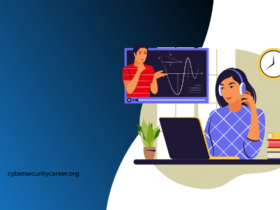When it comes to cyber security, there is no one size fits all solution. Different technologies pose different threats and require different solutions to protect against them. One popular choice is the Macbook, but are they good for cyber security? Before investing in a Macbook as your go-to device for protecting yourself online, it’s essential to understand the pros and cons of using this type of laptop regarding cyber security. This blog post will explore the various aspects of Macbooks that make them a great or not-so-great choice for protecting yourself online.
What is Cyber Security?
Cyber security is the practice of protecting networks, devices, and data from malicious attacks. It includes hardware and software technologies and policies and procedures designed to safeguard information from unauthorized access or theft.
The need for cyber security has grown exponentially in recent years as computers and the internet have become more widespread. With more businesses and individuals using online services, there is a greater risk of data breaches and attacks. In addition, the rise of mobile devices and the Internet of Things (IoT) has created new vulnerabilities that cybercriminals can exploit.
As cyber-attacks become more sophisticated, it is critical to have robust cyber security measures in place to protect against them. This includes ensuring that all devices and software are updated with the latest security patches, using firewalls to block unwanted traffic, training employees on the spot and reporting suspicious activity.
The Different Types of Cyber Attacks
Many different types of cyber-attacks can be used to target Macbooks. Some of the most common include:
- Malware: Malicious software that is designed to damage or disable computers. This can include viruses, worms, Trojans, and more.
- Phishing: A social engineering attack involving tricking users into disclosing sensitive information, such as passwords or credit card numbers.
- Denial of service (DoS): An attack that attempts to make a computer or network unavailable to its users by flooding it with traffic or disabling critical services.
- Man-in-the-middle (MitM): An attack where the attacker intercepts communications between two victims and impersonates each victim to the other.
- SQL injection: An attack exploits vulnerabilities in web applications that use SQL databases. The attacker can insert malicious SQL code into input fields on a web page which is then executed by the database, allowing them access to sensitive data.
How to Protect Yourself from Cyber Attacks?
In the wake of the WannaCry ransomware attack that hit over 150 countries, ensuring your devices are secure is more critical than ever. Here are some tips to protect yourself from cyber attacks:
- Keep your software and operating system up to date. Install security patches as soon as they’re available.
- Use a strong password and never reuse passwords across different accounts.
- Use two-factor authentication whenever possible. This adds an extra layer of security by requiring you to enter a code from your phone in addition to your password when logging into an account.
- Be cautious about what you click on and download. Don’t open email attachments from unknown senders; be careful when downloading files from the internet – only download from trusted sources.
- Back up your data regularly if you become a victim of a cyber attack and need to restore your files.
The Different Types of Macbooks
There are many different types of Macbooks, each with its features and benefits. Here is a breakdown of the most popular models:
The MacBook Pro is the most potent and popular MacBook model. It has a large screen, a high-performance processor, and top-of-the-line features.
The MacBook Air is a more lightweight and portable option. It has a longer battery life and a lower price tag than the Pro model.
The 12-inch MacBook is the smallest and most portable MacBook option. It has a Retina display and long battery life but lacks some of the power and features of the other models.
The Benefits of Macbooks for CyberSecurity
There are many benefits to using a Macbook for cyber security. They include:
- The operating system is more secure: MacOS is less vulnerable to malware and viruses than Windows. It is also easier to keep your Macbook secure with updates and features.
- You can run Windows on a MacBook: If you need to use specific software for your job or study, you can install Windows on a Macbook using Boot Camp. This means you can have the best of both worlds – the security of a Macbook and the ability to use Windows apps when needed.
- Macbooks are portable: You can take your Macbook with you wherever you go, making it easy to work on the go or in different locations. This is especially beneficial if you work in an industry where you need to be able to access sensitive data from anywhere.
- They have long battery life: With a long battery life, you can work all day without worrying about finding a power outlet. This is important for mobile workers who need to stay productive even when no convenient power source is available.
The Limitations of Macbooks for Cyber Security
Macbooks have a few limitations that users should be aware of regarding cyber security:
- PCs are less secure than Macbooks regarding malware and viruses. This is because Macs are less common than PCs, so fewer viruses and malware are designed for them.
- Macs are more expensive than PCs, so they may not be the best option for those on a budget.
- Macs can be more difficult to troubleshoot than PCs, so users may need support from Apple or a third-party provider if they encounter any issues.
What are the Best Cyber Security Practices for Macbooks?
There are several best practices regarding securing your Macbook from cyber threats. First and foremost, always keep your operating system and software up to date with the latest security patches. This will help close any potential vulnerabilities that hackers could exploit.
Another essential practice is using strong, unique passwords for all your online accounts. Avoid using easily guessed words or phrases, and never reuse passwords across multiple sites. You should also enable two-factor authentication as an extra layer of protection.
Don’t click on links or open attachments from unknown senders, as these could contain malware or phishing scams designed to steal your personal information. When possible, only download files from trusted sources. And be sure to install a reputable antivirus program on your Macbook to catch any malicious software that can slip through.
Following these simple steps can help keep your Macbook safe from cyberattacks.
How to Secure Your Macbook from Cyber Attacks?
In light of the recent string of cyber attacks, ensuring your Macbook is as secure as possible is more important than ever. Here are a few tips to help keep your computer safe:
Install a reputable antivirus program and keep it up to date. This will help protect your computer from malicious software that could be used to gain access to your personal information.
Create strong passwords for all of your accounts and never reuse them. Cybercriminals often target weak or easily guessed passwords, so make sure yours are strong and unique.
Enable two-factor authentication for additional security. This adds an extra layer of protection by requiring you to enter a code from your phone in addition to your password when logging into an account.
Be cautious about what you click on and download. Avoid clicking on links in emails or websites you don’t trust, as these could lead to malware or phishing scams. Only download files from trusted sources.
Keep your software up to date. Install updates for your operating system and other programs as soon as they’re available, as these often include security fixes for newly discovered vulnerabilities.
Following these tips can help keep your Macbook safe from cyber attacks.
Pros and Cons of Macbooks for CyberSecurity
When it comes to laptops, there are two main types of operating systems: Windows and macOS. So, which is better for cyber security: a Macbook or a Windows laptop?
There are pros and cons to both types of laptops. Here are some things to consider when making your decision:
Macbooks:
Pros:
- Macs have built-in security features that make them more resistant to viruses and malware than Windows computers.
- The macOS operating system is less vulnerable to exploitation than Windows.
- Macs receive security updates from Apple regularly.
Cons:
- Macs are not immune to viruses and malware. There have been instances of malware specifically designed to target Macs.
- The closed ecosystem of Apple products can make it challenging to find cyber security tools compatible with macOS.
Conclusion
In conclusion, Macbooks are potent tools for cyber security. They come with various features that make them ideal for the job, from their secure operating system to their fast processors and reliable hardware. No matter what kind of security work you need, a Macbook will surely be up to the task. If you’re looking for an easy way to protect yourself online, investing in a Macbook could be one of your best choices.










Leave a Reply